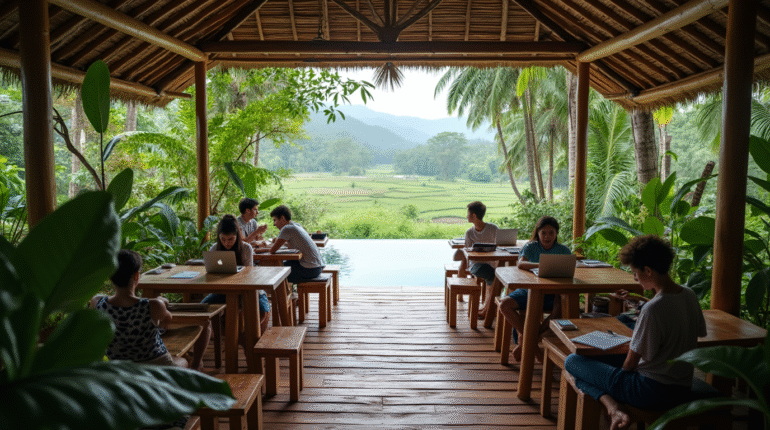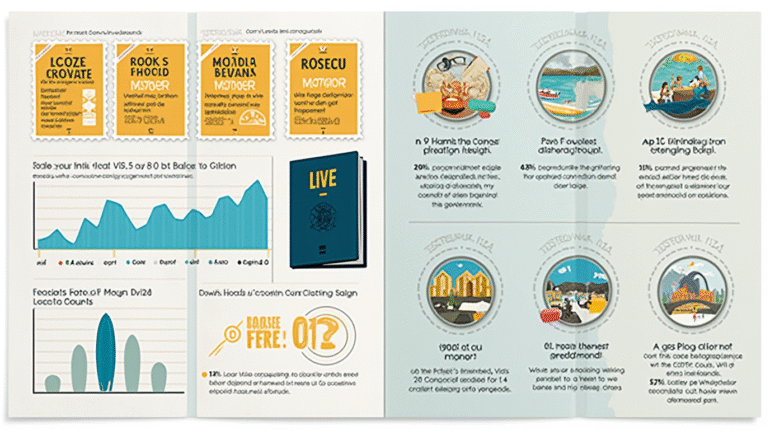Remote work has changed how people pursue their professions, allowing a lifestyle sometimes called digital nomadism—working remotely while traveling the world. Attracted by these location-independent workers, many countries have introduced digital nomad visas that permit them to live and work in a foreign country legally. Portugal, Bali (Indonesia), and Costa Rica are robust programs for visas, colorful communities of nomads, and lifestyles powerful in 2024 for such places to be popular destinations. South Africa, Serbia, and El Salvador are emerging destinations gaining attention due to affordability and offers that are unique offers. This article compares these places with an analysis of visa requirements, cost of living, infrastructure culture, supported by insights from Lonely Planet Nomad List and related sources, toward creating a comprehensive guide for the digital nomad.
Portugal: A European Hub for Digital Nomads
Portugal is already one of the most desirable destinations for digital nomads. It is often called the Bali of Europe and creates a very warm ambience for remote work. The country also presents the D8 Digital Nomad Visa, founded in 2022 in two categories: one is a one-year temporary stay visa, and another is a five-year renewable residence permit with full citizenship rights.

The major requirement here shall be a minimum monthly income level of €3,280 ($3,500), health insurance, recorded accommodation, and no criminal record; then the rest depends upon the mood of the applicant while submitting. A collection of visa fees encompasses about €110 that has been paid for obtaining a national visa. Additional fees are imposed in the form of a tax related to the issuance of a residence permit.
Bali, Indonesia: A Tropical Paradise with Visa Challenges
Bali remains a dream destination for digital nomads, known for its lush landscapes, spiritual culture, and laid-back lifestyle. While Indonesia has discussed a dedicated digital nomad visa for years, as of 2024, Bali primarily relies on the B211A Social/Cultural Visa, valid for 60 days and extendable up to 180 days, or the Second Home Visa for high-income professionals with a $130,000 bank balance, which lasts up to 10 years.

The B211A requires proof of income (unspecified amount) and costs around $150, but frequent visa runs or extensions can be cumbersome. Nomad List ranks Bali highly for its low cost of living—$750 to $2,600 USD per month—and strong nomad community, particularly in Canggu, where an estimated 5,000 remote workers reside. Internet speeds average 29.65 Mbps for mobile and 94.03 Mbps for fixed connections, sufficient for most remote work but less reliable in rural areas. Bali’s coworking spaces, like Tribal Bali, and abundance of cafes cater to nomads, while surfing, yoga, and temple visits provide leisure options. However, Lonely Planet notes challenges like overtourism, traffic congestion, and occasional backlash against influencers, with some deportations reported during the pandemic. The lack of a streamlined digital nomad visa and high income thresholds for the Second Home Visa make Bali less accessible for budget-conscious nomads.
Costa Rica: Pura Vida for Nature Lovers
Costa Rica’s “Pura Vida” lifestyle, eco-friendly environment, and stunning natural beauty make it a top choice for digital nomads seeking a relaxed yet adventurous base. The country’s Digital Nomad Visa, introduced in 2021 and updated in 2023, allows remote workers to stay for one year, with the option to extend for another year if they spend at least 180 days in the country. Applicants must prove a stable monthly income of USD 3,000 ($4,000 for families) or a $60,000 bank deposit, with a visa fee of $90 plus additional costs post-approval. Nomad List estimates the cost of living at $1,000 to USD 1,600 per month, with coworking spaces like Selina offering high-speed internet (average 50 Mbps) and workstations. Visa holders enjoy tax exemptions on foreign-earned income, the ability to open local bank accounts, and the right to drive with a foreign license. Lonely Planet praises Costa Rica’s biodiversity, from rainforests to beaches, and its stable democracy, making it ideal for nomads who love surfing, hiking, or wildlife exploration. However, the country’s relatively high cost of living compared to other Latin American destinations and occasional infrastructure issues, like power outages, may pose challenges. The welcoming culture and microclimates—from beach towns to cloud forests—enhance its appeal for work-life balance.
Emerging Destinations: South Africa, Serbia, and El Salvador
Emerging destinations like South Africa, Serbia, and El Salvador are gaining attention for their affordability, unique cultures, and developing digital nomad programs. South Africa launched its Digital Nomad Visa in April 2024, targeting remote workers earning at least ZAR 1 million ($53,600) annually, with a validity of up to three years. The visa’s high income requirement may limit accessibility, but Cape Town’s low cost of living ($800–USD 1,500 monthly), fast internet (60 Mbps average), and vibrant coworking scene make it attractive, per Nomad List. Serbia is developing a digital nomad visa with a proposed €3,500 monthly income requirement, offering a one-year stay.

Its affordability ($700–USD 1,200 monthly), rich history, and growing nomad hubs in Belgrade and Novi Sad appeal to budget-conscious nomads. El Salvador, set to launch its digital nomad visa in mid-2025, is an emerging hotspot due to its surfing beaches, Bitcoin-friendly policies, and low cost of living ($600–USD 1,200 monthly). Lonely Planet highlights El Salvador’s progressive tech scene, but its developing infrastructure and safety concerns require caution. These destinations offer fresh alternatives to established hubs, though their visa programs are still evolving, and infrastructure may lag.
Comparing Key Factors: Visa Accessibility, Cost, and Lifestyle
When comparing Portugal, Bali, and Costa Rica, each excels in different areas. Portugal offers the most structured visa program, with clear pathways to residency, but its high income requirement and mandatory stay periods demand commitment. Bali’s visa process is less straightforward, requiring extensions or significant wealth for the Second Home Visa, but its low cost of living and vibrant nomad community make it accessible for short-term stays. Costa Rica strikes a balance, with a moderate income threshold, tax benefits, and a renewable visa, though its cost of living is higher than Bali’s. Emerging destinations like South Africa, Serbia, and El Salvador are more affordable but face hurdles like high income requirements or underdeveloped programs.

Internet reliability is strongest in Portugal, followed by Costa Rica, while Bali and emerging destinations may experience inconsistencies. Lifestyle-wise, Portugal offers urban sophistication, Bali provides tropical spirituality, Costa Rica delivers nature-driven adventure, and emerging destinations blend cultural immersion with budget-friendly living. Nomad List data underscores Portugal’s superior infrastructure, while Lonely Planet emphasizes Costa Rica’s eco-appeal and Bali’s cultural allure.
Challenges and Considerations for Digital Nomads
Digital nomads must weigh several factors beyond visa requirements. Portugal’s high cost of living in cities like Lisbon and strict residency rules may not suit those seeking flexibility. Bali’s visa uncertainty and overtourism can disrupt long-term plans, while Costa Rica’s infrastructure issues, like spotty electricity, may affect productivity. Emerging destinations offer affordability but require navigating less mature nomad ecosystems—South Africa and El Salvador, for instance, have safety concerns, and Serbia’s visa details remain unclear. Health insurance is mandatory for most visas, and nomads should ensure comprehensive coverage, as advised by Lonely Planet. Tax implications vary: Costa Rica and Bali (via the Second Home Visa) offer tax exemptions on foreign income, while Portugal provides a reduced 15% tax rate for the first four years. Nomads must also consider cultural fit—Portugal and Costa Rica are welcoming to foreigners, Bali has faced tensions with influencers, and emerging destinations are still building nomad-friendly environments.



